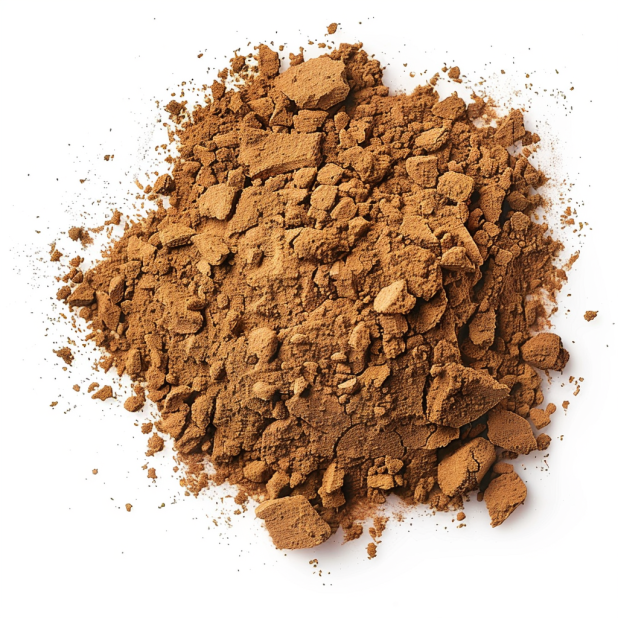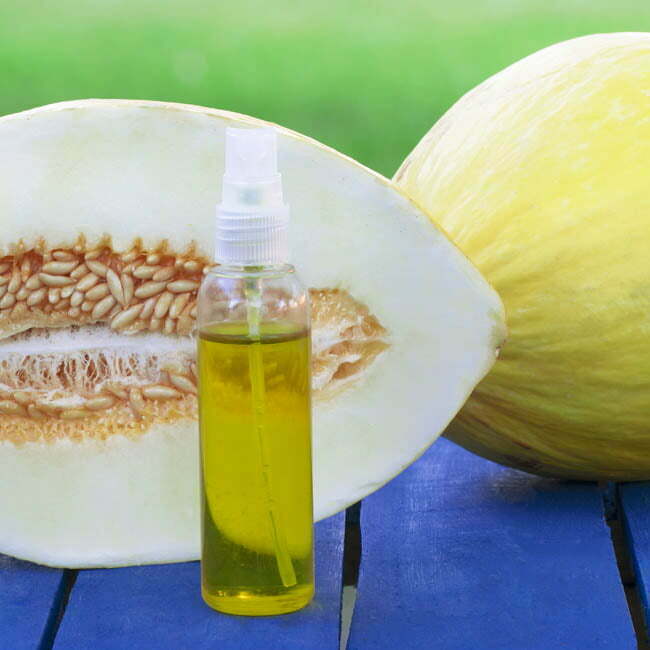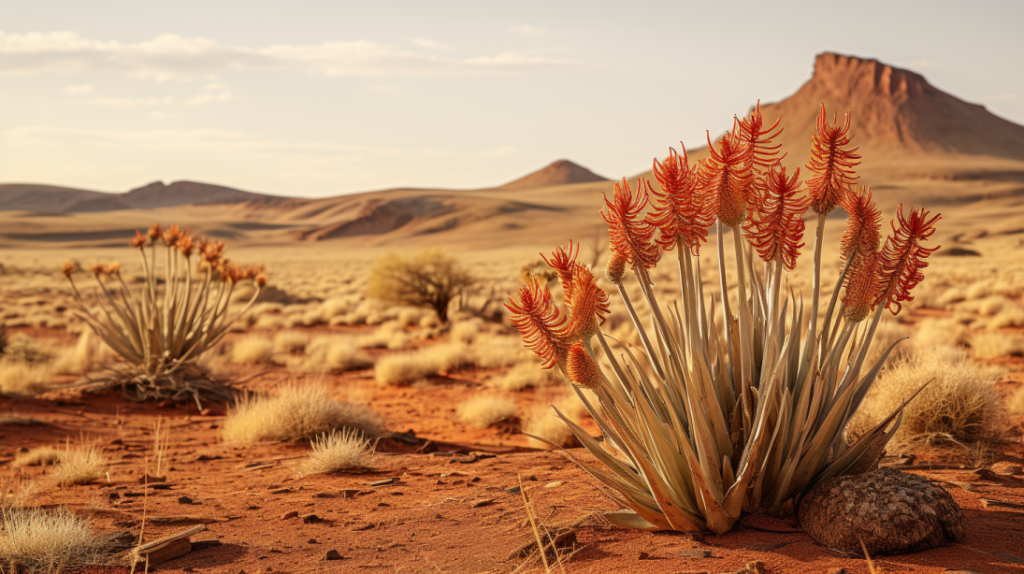Africa, a land teeming with diverse ecosystems, nurtures plants with extraordinary properties. The Kalahari Melon and Devil’s Claw are two such marvels, each with noteworthy cosmetic virtues. The Kalahari Melon, thriving in harsh environments, is a reservoir of hydration and nutrients, making it an oasis for skin care. Its oil, rich in fatty acids, is a boon for maintaining skin health. On the other hand, Devil’s Claw, named for its peculiar appearance, harbours anti-inflammatory qualities. It’s a treasure in alleviating skin ailments and enhancing suppleness. These plants, though humble in their habitats, are giants in the beauty realm. Their integration into skincare routines speaks of Africa’s untapped botanical wealth, offering a natural, effective alternative to synthetic products. Thus, these plants stand not just as symbols of African flora but as beacons of potential in the ever-evolving world of beauty and skincare.
Kalahari Melon: A Resilient Source of Hydration and Nourishment
The Kalahari Melon (Citrullus lanatus var. citroides) is an indigenous plant of the Kalahari Desert, able to survive the most arid conditions on earth. This melon, whose skin and fruit structure reminds one of its distant cousins -the watermelons – finds very little attraction or love as another wild fruit. The oil of the seeds of Kalahari Melon is rich in fatty acids, especially linoleic, oleic, and palmitic acid. Such types of fatty acids play an essential role in keeping the normal barrier functions of the skin and preventing it from the loss of water dehydration of epithelium. The lightweight, non-greasy oil content in the Kalahari Melon seed is of great benefit in that it does not stick to the products in which it is formulated – skincare and others during processing into oil.

Secondly, the Kalahari Melon seed oil contains antioxidants like Vitamin E. Antioxidants are essential in that they protect the skin from environmental stress factors, including pollution and UV radiation. This oil can help reduce the signs of ageing, such as lines and wrinkles, mainly if applied daily or a few times a week.
Devil’s Claw: Anti-inflammatory and Healing Properties
Devil’s Claw, from Africa’s savannas, is known for reducing inflammation. Its fruit has unique hooks. Used in traditional medicine, it alleviates arthritis and digestion problems. In cosmetics, it calms and heals skin, aiding in issues like acne or eczema. Harpagoside and harpagide are essential compounds that minimize redness and swelling. Furthermore, it assists in skin repair and is found in products for scars and minor injuries.

Devil’s claw extract
Devil’s claw extract was first used by South Americans over 2,000 years ago. Back then, it was applied to combat muscle and joint pain. Nowadays, it’s popular mainly in natural medicine.
This plant, Harpagophytum procumbens, is a treasure in both herbal remedies and skincare. Its anti-inflammatory traits come from particular substances within. These help soothe upset skin, tackling irritation and promoting recovery. It’s not just a plant; it’s a solution for discomfort and skin woes. Whether it’s aching joints or troubled skin, Devil’s Claw offers relief. Its presence in skincare items underscores its value in healing and rejuvenation. Thus, this African plant stands out for its dual role in health and beauty, providing natural solutions for common ailments and skin challenges.
Sustainable Harvesting and Ethical Considerations
In the ever-expanding beauty world, the Kalahari Melon and Devil’s Claw are rising stars. Yet, their popularity brings a challenge: how do we use them without harm? It’s a delicate dance of taking just enough but not too much, ensuring these plants can thrive for years to come. This balance is critical to protecting our planet and the people who call these regions home.
Enter ethical sourcing, a beacon of hope. It’s about fairness, making sure those local to these plants gain from their global fame. Think fair trade – a handshake between local and international, a promise of respect and benefit.

Melon seed oil
Melon seed oil contains vitamins A and E as well as saturated and unsaturated fatty acids. As a rich source of vitamins, it helps to keep your skin healthy and young-looking.
Then, there’s sustainable cultivation, like a gardener tending with care. It’s growing these plants without draining nature’s resources or hurting the ecosystem. This approach is a commitment to our future, preserving these natural treasures and supporting the communities they sustain.
By weaving together these practices, the cosmetic industry doesn’t just beautify – it becomes a guardian of nature and cultures.
Conclusion
The fascinating world of African desert plants, specifically the Kalahari Melon and Devil’s Claw, is a goldmine for the cosmetic industry. These tough plants, thriving in harsh climates, are packed with benefits. The Kalahari Melon is a hydration hero, providing essential moisture to the skin. In contrast, Devil’s Claw stands out for its ability to soothe and reduce inflammation.
As their popularity in skincare soars, it’s vital to harvest these plants sustainably. We must avoid overusing them to protect their natural populations and the delicate desert ecosystems. It’s just as essential to ensure local communities are involved and fairly compensated for their work in harvesting these plants.
In sum, Kalahari Melon and Devil’s Claw showcase the wealth of nature’s offerings in the African desert. Their use in cosmetics isn’t just about beauty; it’s a call for responsible use. Balancing commercial interests with the need to protect and preserve ensures that these remarkable plants continue to benefit us without harming their natural environment or the communities that rely on them.
References
Nyam, K. L., Tan, C. P., Lai, O. M., Long, K., & Man, Y. B. C. (2009). Enzyme‐assisted aqueous extraction of Kalahari melon seed oil: optimization using response surface methodology. Journal of the American Oil Chemists’ Society, 86(12), 1235-1240.
Mncwangi, N., Chen, W., Vermaak, I., Viljoen, A. M., & Gericke, N. (2012). Devil’s Claw—A review of the ethnobotany, phytochemistry and biological activity of Harpagophytum procumbens. Journal of ethnopharmacology, 143(3), 755-771.
Desam, N. R., & Al-Rajab, A. J. (2021). The importance of natural products in cosmetics. Bioactive natural products for pharmaceutical applications, 643-685.


